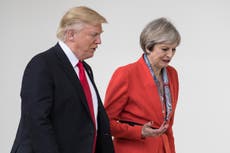The US intelligence leaks prove that when reporting on terrorism, further media regulation is needed
Do we really, as the general public need to know the name of the Manchester murderer, or do we just want to know? Do we have a right to his name, even if we increase our risk of future attacks as a result?


British security and police services have expressed shock and disbelief that Manchester crime scene photographs were both leaked to and published by the New York Times. “This could harm our investigation”, UK authorities have said.
If I physically held back a policeman I would be arrested. Is the media constraining the police? Or, is the media different from the general public?
It is time for an open discussion about the boundary that separates freedom of the press (and freedom of expression) on one hand, and national security on the other. We urgently need this conversation now because Isis has re-written the guide books on terrorism. They have changed the game and maybe we need to change too.
Isis uses social media and mainstream media to reach deep inside our communities. They find, inspire and link people to carry out murderous attacks, claiming a fallacious link to Islam.
Back in “old style” wars, like World War II, if the enemy Germans (as they then were) reached into the UK, US or Australian communities to inspire attacks, authorities would have responded with at least legal sanction and at most, lethal force. Spies could be shot on sight.
In “new style” wars, recruitment, inspiration and even battles are and will be fought in cyberspace as well as on the ground. Spies operate online. Why then, if the battle is partly in cyberspace, and cyberspace is used to encourage and inspire attacks, don’t we punish those who facilitate and ease the path for our adversaries to undermine our homelands?
Back during World War II the government reminded people that “loose lips sink ships”. People knew back then that one did not need to “intend” to cause harm. Even accidental leaking of information could kill people.
But what if you spread information in full knowledge that you were doing the enemy’s work for them?
One of the key tactics in Isis’ jihad is to use the media and social media to not only recruit, but to increase fear and terror in our minds. Terror is a key objective of terrorism. Social media and the media augment the impact of the terrorists.
The media know this to be true. The media know that “fear” is a direct consequence of the reporting.
Helping the terrorist spread their message then, is surely “providing material support to terrorism”? Surely this is so, just as much as giving money or buying a bullet for them? Media and social media companies know terrorists want to inspire fear – communication helps terrorists inspire fear and then what? Publishers claim that they do not mean to help terrorists and instead are a “vital part of a functioning democracy”?
Here is the rub. Independent media and free expression are parts of our society. If we limit the media are we not changing our society making it more authoritarian? Is this what the terrorists want too?
Do we censor the media for National Security reasons, running up agains the Freedom of the Press, Freedom of Expression and the public’s so-called “right to know”? Do we put in limits?
The truth is we already do. We already put limits on the reporting of the actions of our security services.
The US, UK and Australia, just three of the many allied countries facing the terrorists, all have different approaches to the media and Freedom of Expression. The US has their Bill of Rights, the UK has the Human Rights Act and the Australian High Court has written into Australia’s Constitution “a limited right to free speech inherent in the Westminster System of Government”.
So if we have boundaries on expression and press, and the game has changed since the boundaries were drawn, where should the new boundary be?
I firmly believe that the names of terrorist murderers should not be published without the specific consent of the Security Services. Lone-wolf terrorists crave a belonging, crave notoriety and crave membership of a “club”. Publishing the names helps terrorists achieve their aims and inspires other murderers to follow in their footsteps.
Do we really, as the general public “need to know” the name of the Manchester murderer, or do we just “want to know”? Do we have a “right to know”, even if in knowing the name we increase our risk of future attacks? Some people will say the risk is worth it.
I disagree. If the police need information and think that publishing the name will help then police can authorise publication. But if not, why do we want to increase our risk just so we can know a dead murderer’s name?
Equally I believe we should get our terminology right. Calling these people “suicide bombers” denotes credibility that they are “warriors” in a war. They are not warriors. They are murderers.
I call upon the media here to adopt a voluntary code of conduct to not publish the names of terrorist murderers unless the police ask. I also call upon the media to stop using the term “suicide bomber” and start using the factual name “suicide murderer”.
If the media cannot self-regulate, then Parliament should step in, for our safety’s sake.
Andrew MacLeod is a visiting Professor at Kings College London


Join our commenting forum
Join thought-provoking conversations, follow other Independent readers and see their replies